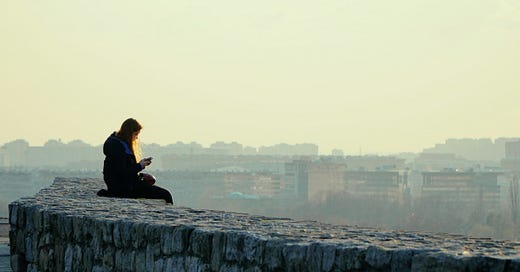
On reading Adrienne Rich’s "In Those Years"
The notion of “We the people . . .” seems almost quaint these days. It’s small comfort to know that this poem is thirty years old – that polarization and American-style hyper-individualism are nothing new. Still, one can scarcely imagine what Rich would say about the current political situation – not to mention the way we’re all staring numbly down into our hand-held devices. Alone. In silence.
But it doesn’t have to be that way. I spent my professional life in the world of community colleges, and I can attest to the fact that the community in community colleges is more than a just a name. Their mission is to build and strengthen the communities they serve. And the basis of community is, as always, relationships.
During my time at Prince George’s Community College, for example, the strategic plan cited the creation of “purposeful connections” as one of the keys to student success. What did that mean? Connections among classmates that encouraged students to study, commiserate, and relax together. Meaningful connections with the material that ensured students saw its relevance to their chosen fields. Connections to faculty members who knew their students as people, not just names on a roster. Connections among faculty and staff that let us learn from and support each other.
And it started with this mantra: Show up. Smile. Reach out. Believe. That mantra is even more important in our communities.
The “great dark birds of history” in the final stanza of this poem are particularly attracted to the word I. Sticking together seems to be the best way to ward off their talons.
Of course, sticking together does not mean being of one mind. Any historian will tell you that “We the people” have never been of one mind. “We” is not singular, it’s plural, and the United States is certainly a pluralistic country.
Sticking together means showing up for each other – like the volunteer fire department does. It means smiling at each other – like neighbors do. It means reaching out, and believing the “other” will do the same.
Adrienne Rich (1929 – 2012) was born in Baltimore. Her collection Diving into the Wreck won the National Book Award in 1974. “In Those Years”1 was published in Dark Fields of the Republic (1995).
What’s Your Story?
Dennis Huffman’s reflection reveals the relevance of Adrienne Rich’s poem, “In those Years,” perhaps even more now than when she wrote the poem in 1991. That’s the thing about a good poem, it often speaks to universal truths and provides wisdom many years down the road.
I invite you to read the poem and see what it says to you. Then, consider sending in a short reflection on the poem (up to 250 words). Below are some prompts that may work for you (if not, feel free to come up with one of your own).
When you close your eyes and imagine “we the people,” what do you see?
Technology has connected us in many ways, but there is definitely such a thing as too much of a good thing. Are there ways in which you limit your screen time, or activities which you have declared to be technology free?
Think of a time when you reached out to a stranger. What happened?
We’d be delighted to work with you to post your reflection here on Substack and on the Building Bridges Word by Word website. Each story is a valuable part of the bridge we’re building across our divides!
For more details, check out our Story Guidelines. Questions? Feel free to email me at mscribner.buildingbridgeswbw@gmail.
I don’t have permission to post “In Those Years.” This entails writing to the author, the author’s estate, or the publisher and most often paying a permission fee. But it’s standard practice to post a few lines from the poem without permission and include the link to the poem - which I have done. I invite you to read it in full, it’s well worth your time!





Preferred pronoun: We.
Favorite fantasy: We-world.
Verbs: Ask, accept, act.
I loved the phrase in the poem "our personal weather." So ridiculous. But I'm guilty of it, too. Wrapped up in the "rags of fog" we walk around like islands.